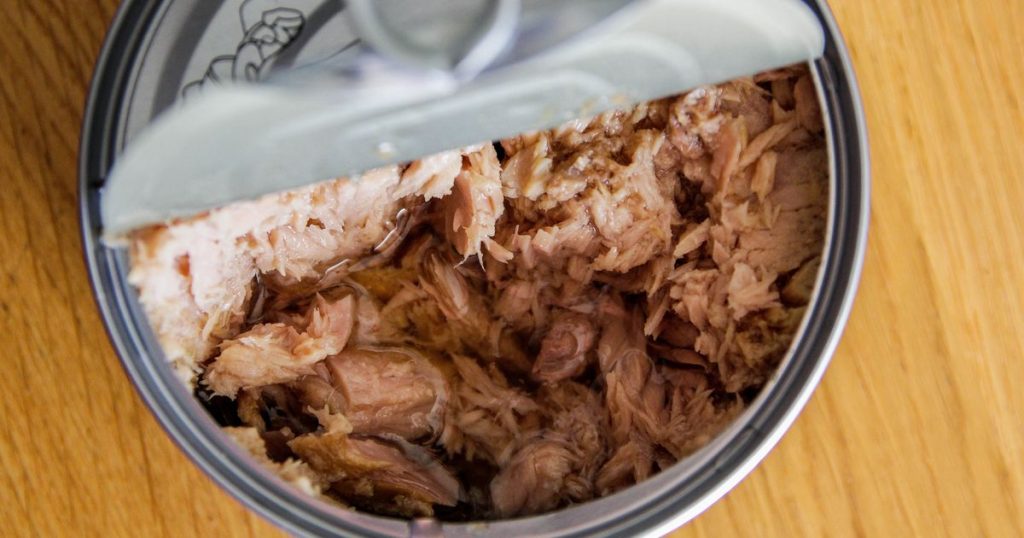Canned Tuna Recall: What You Need to Know
A recent announcement has left many consumers concerned: multiple brands of canned tuna sold in popular stores like H-E-B, Trader Joe’s, Publix, and Costco have been recalled due to the potential risk of botulism, a severe and potentially fatal form of food poisoning. The voluntary recall, issued by Tri-Union Seafoods, affects several of its canned tuna products sold under various brand names, including Trader Joe’s, H-E-B, Genova, and Van Camp. The issue stems from a manufacturing defect in the cans’ “easy open” pull tab feature, which may compromise the product’s seal over time, leading to contamination.
The affected products were distributed across multiple states under different labels. For example, tuna sold under the H-E-B label was available only in Texas, while Trader Joe’s-branded tuna was sold in states like Delaware, Illinois, Indiana, Iowa, and others. Genova-branded tuna, available in both 5 oz. and 7 oz. cans, was distributed to stores such as Costco, Publix, H-E-B, and Walmart in states like Florida, Georgia, and Texas. Van Camp’s label tuna, meanwhile, was sold in Pennsylvania, Florida, and New Jersey. Consumers are advised to check the Universal Product Code (UPC) and best-by date on their cans to determine if their product is part of the recall. A full list of impacted products is available on the Food and Drug Administration’s (FDA) website.
What to Do If You Have the Recalled Tuna
If you suspect you purchased one of the recalled tuna products, there are several steps you can take to address the issue. First, you can return the product to the store where you purchased it for a full refund. Alternatively, Tri-Union Seafoods encourages consumers to dispose of the product safely or contact the company directly for a retrieval kit and replacement coupon. For assistance, consumers can reach out to the company via email at support@thaiunionhelp.zendesk.com or by calling the toll-free number 833-374-0171.
It’s important to note that while no illnesses have been reported yet, consumers should not consume the affected tuna, even if it appears unspoiled. The recall was initiated as a precautionary measure after the company was notified by its supplier about the potential defect. The notification highlighted that the defect could lead to leakage or contamination with Clostridium botulinum, the bacteria responsible for botulism.
Symptoms of Foodborne Illness: What to Watch For
If you believe you may have consumed one of the recalled tuna products, it’s crucial to remain vigilant and monitor your health closely. Botulism is a rare but serious illness caused by a toxin produced by Clostridium botulinum. Early symptoms of foodborne illness, including botulism, may include an upset stomach, diarrhea, vomiting, or bloody stool. As the condition progresses, more severe symptoms such as difficulty breathing, paralysis, or slurred speech may develop.
If you experience any of these symptoms—or if you’re concerned about potential exposure to the contaminated tuna—it’s essential to seek medical attention immediately. Botulism can be fatal if left untreated, but early intervention can significantly improve outcomes. Remember, it’s always better to err on the side of caution when it comes to your health. If you’re unsure or feel unwell, consult your doctor as soon as possible.
Understanding the Risks of Botulism
Botulism is a rare yet potentially life-threatening condition caused by the toxins produced by Clostridium botulinum. This bacteria is commonly found in soil and can survive in improperly sterilized canned goods, where it thrives in low-oxygen environments. When consumed, the toxins produced by the bacteria attack the nervous system, leading to muscle weakness, breathing difficulties, and, in severe cases, paralysis.
The good news is that botulism is treatable, especially if caught early. Medical professionals can administer antitoxins to neutralize the effects of the toxin and provide supportive care to manage symptoms. However, prompt action is critical, as the condition can progress rapidly. For this reason, it’s important for consumers to take the recall seriously and avoid consuming any of the affected products, even if they appear perfectly sealed or fresh.
Stay Informed and Take Action
The recall serves as a reminder of the importance of staying informed about food safety and taking proactive steps to protect yourself and your family. If you purchased any of the recalled tuna products, don’t hesitate to follow the recommended steps—whether that means returning the product to the store or contacting the manufacturer directly. If you have concerns about your health, reach out to a medical professional without delay.
For more information about the recall, including a full list of affected products, you can visit the FDA’s website or contact Tri-Union Seafoods directly. By staying vigilant and taking the necessary precautions, you can help ensure your safety and peace of mind during this recall.















